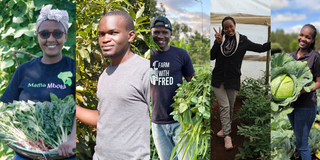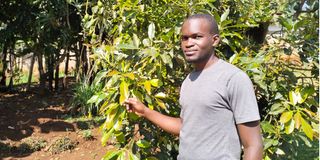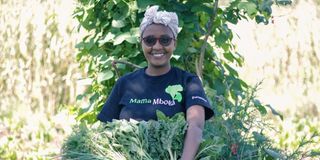
Young agripreneurs are infusing the sector with new ideas, advanced technologies, and a passion for sustainable practices.
Agriculture is more than just an economic sector for Kenya—it’s the backbone of the country’s development, contributing significantly to GDP and employing millions.
Despite its importance, the sector has faced numerous challenges, including the aging population of farmers, limited technological adoption, changing climate patterns, and diminishing land productivity.
However, a quiet revolution is taking place as Kenya’s youth embrace agriculture, not as a subsistence activity but as a business. These young agripreneurs are infusing the sector with new ideas, advanced technologies, and a passion for sustainable practices.
Their work is transforming agriculture into an innovative, profitable, and attractive career path, addressing critical issues like food security, rural poverty, and climate change along the way.
Meet five young agripreneurs who are leading this transformation and leaving a legacy for future generations.
Fred Munene, 35, Agronomist and Founder of Farm with Fred
Fred Munene’s journey into agriculture started with a desire to change the narrative around farming in Kenya. As an agronomist, Fred spent years working with small-scale farmers, offering consultancy on crop management, soil health, and pest control. But he realised there was a missing link: many farmers were unable to apply the advice due to a lack of resources or inadequate follow-up.
Determined to address this gap, Fred ventured into farming himself and founded Farm with Fred, an initiative designed to inspire and guide farmers through practical, scalable, and sustainable practices.
"Agriculture is the lifeblood of our economy, yet it is underappreciated. I wanted to show that farming can be both sustainable and highly profitable," Fred says.
Fred's farming practices incorporate cutting-edge technology such as drones for crop monitoring, AI-powered irrigation systems, and solar-powered mechanisation tools.
"We also use organic farming methods to improve soil health and reduce dependency on harmful chemicals," he adds. His demonstration farms, located in Kiambu and Nakuru counties, serve as training grounds for other farmers.
Despite his achievements, Fred faces ongoing challenges, including erratic weather patterns and fluctuating market prices. “Securing capital remains a significant obstacle for small-scale farmers and agripreneurs,” he explains, adding that market volatility and climate change complicate planning and management. Financial constraints can impede progress, despite his commitment to acquiring new technologies and optimising resources.

Fred Munene is an agronomist and founder of Farm with Fred.
He points out that government support for agripreneurs is limited, with existing policies discouraging agricultural investment. He calls for reforms to lower costs and improve the quality of farm inputs, emphasising the need to prioritise agriculture as a vital sector for economic development. He believes that these policy changes could revitalise the industry and empower agripreneurs to promote growth and innovation.
To address these, he advocates for stronger public-private partnerships in agriculture. "The government and private sector must work together to provide farmers with affordable inputs, market access, and insurance schemes," he asserts.
Through his initiative, Fred is mentoring young farmers, helping them navigate the complex world of agribusiness. His ultimate vision is to create a Pan-African agricultural network that promotes innovation, collaboration, and food security.
Grace Ruiru, 30, Founder of The Soil Inventory
For Grace Ruiru, agriculture has always been a calling. Growing up in rural Kenya, she developed a fascination with plants and animals that led her to study horticulture. During her fieldwork, she discovered a significant gap in how farmers managed their soil. This inspired her to launch The Soil Inventory, a service that combines scientific research with practical farming solutions.
"Most farmers don’t know what their soil needs. They rely on guesswork, which often leads to poor yields," Grace explains. Her company provides soil testing, data analysis, and tailored recommendations to help farmers optimise their land.
Grace also advocates for climate-smart agriculture, incorporating techniques such as cover cropping, agroforestry, and drip irrigation. "These practices not only improve productivity but also enhance resilience to climate change," she notes.

Grace Ruiru founded ''The Soil Inventory," an initiative aimed at bridging the gap between academic research and actual farming practices.
Convincing farmers to adopt modern methods hasn’t been easy. Many are reluctant to invest in soil testing, seeing it as an unnecessary expense. Grace tackles this challenge by demonstrating the long-term benefits of soil health. "When farmers see the results—higher yields and lower costs—they become advocates themselves," she says.
In the future, Grace plans to integrate digital tools like mobile apps and AI-driven soil diagnostics into her services. She also aims to expand her outreach to underserved regions, where agricultural support is scarce.
Mutuma Muriuki, 27, CEO of Eco Bristo Limited
At just 27, Mutuma Muriuki is a trailblazer in eco-agriculture. Growing up in Meru County, he witnessed how traditional farming practices were becoming unsustainable due to declining soil fertility and excessive chemical use. Determined to find a solution, Mutuma founded Eco Bristo Limited, a company that develops eco-friendly technologies for farmers.
One of Mutuma’s standout innovations is a solar-powered insect trap that reduces reliance on pesticides. Another is biochar, a type of organic fertiliser that improves soil fertility while capturing carbon dioxide. "Our goal is to help farmers increase productivity in a way that’s sustainable for both the environment and their wallets," Mutuma says.

Mutuma Muriuki, CEO, of Eco Bristo Limited a company that focuses on producing solar-powered insect traps and biochar biofertilisers.
The company partners with farmer cooperatives, NGOs, and government programmes to scale its reach. Demonstration farms showcase how Mutuma’s products work, encouraging adoption among hesitant farmers. "When farmers see tangible benefits, they’re more willing to invest in these technologies," he explains.
Mutuma’s next step is to integrate Internet of Things (IoT) sensors into his products, providing farmers with real-time data on pest activity and soil conditions. "The future of farming lies in data. With the right tools, even the smallest farms can become highly efficient," he asserts.
Sharon Cherobon and Pierra Nyaruai, Founders of Mama Mboga Africa
For Sharon Cherobon and Pierra Nyaruai, agriculture isn’t just a business—it’s a mission. Sharon, a degree holder in Agribusiness Management from The University of Nairobi was inspired to enter the agribusiness field after realising that agriculture is an overlooked sector in Kenya, especially among the youth.
"There is a lot of unrealised potential for development and investment," she says.

Sharon Cherobon is the co-founder of Mama Mboga Africa, a community-based initiative aimed at empowering rural women through kitchen gardening.
For Pierra, the farming heritage of her family has had a significant influence even if she did not receive a formal education in agriculture. She grew up in Nakuru and fell in love with agriculture after having a special bonding moment with her father and selling her first veggies.
While the agricultural conditions in her rural Nandi home were promising, Sharon saw firsthand the terrible effects of starvation and malnutrition. This inspired her to seek answers to these urgent problems by pursuing a degree in agriculture. She observed that subsistence farming, which is essential for smallholder farmers' food security, is frequently overlooked in favour of commercial crops.
Together, they launched Mama Mboga Africa, an initiative aimed at empowering smallholder farmers and creating opportunities for youth in agriculture.
The duo provides training, access to affordable inputs, and market linkages for farmers. They also focus on value addition, helping farmers process raw products into higher-value items like jams, juices, and flours. "Value addition is key to making agriculture profitable. It allows farmers to earn more for their efforts," Sharon says.
Through their mentorship programmes, Sharon and Pierra are inspiring a new generation of agripreneurs. They regularly host workshops and school visits to showcase the potential of farming. "We want young people to see agriculture as a career, not a fallback option," Pierra notes.

Pierra Nyaruai is the co-founder of MamambogaAfrica a community-based initiative aimed at empowering rural women through kitchen gardening.
Their initiative has created jobs, improved food security, and strengthened rural economies. Looking ahead, they plan to expand their operations across East Africa, focusing on regions where farmers face the greatest challenges.
Opportunities in youth-led agriculture
Despite these challenges, the future of youth-led agriculture in Kenya is bright. Innovations like hydroponics, vertical farming, and digital marketplaces are opening new avenues for growth. Agritech startups are providing solutions for everything from pest control to supply chain management, making farming more efficient and profitable.
Government initiatives like the Youth Enterprise Development Fund and partnerships with private-sector players are also creating opportunities for young farmers. Programmes that provide training, mentorship, and grants are empowering the next generation of agripreneurs.
The path forward
Kenya’s young agripreneurs are proving that agriculture is not just about survival—it’s about innovation, sustainability, and economic empowerment. Their stories highlight the importance of education, technology, and collaboration in driving agricultural transformation.
As the country grapples with food security and climate change, investing in youth-led agriculture will be critical. With the right support, Kenya’s young farmers can lead the way toward a sustainable and prosperous future.
Sidebar
Challenges facing young agripreneurs
While these young farmers are making significant strides, they face several challenges:
- Access to capital: Many young farmers struggle to secure funding for equipment, inputs, and expansion. High interest rates and strict collateral requirements make loans inaccessible.
- Market linkages: Fluctuating prices, limited market access, and lack of storage facilities reduce profitability. Farmers often rely on middlemen who exploit their lack of bargaining power.
- Climate change: Unpredictable weather patterns, prolonged droughts, and floods disrupt farming activities. Without proper insurance or support, many farmers face devastating losses.
- Policy gaps: Outdated agricultural policies fail to address the needs of modern farmers, particularly youth. More investment is needed in research, infrastructure, and training programs.









